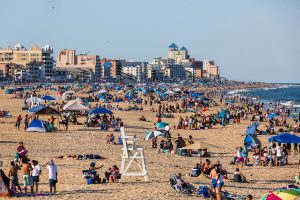
OCEAN CITY — It’s no secret the loss of foreign student workers along with other COVID-related factors greatly impacted the resort’s summer, but the extent of the damage was not really known until the recent release of a survey of businesses.
This fall, the Greater Ocean City Chamber of Commerce sent out a survey to its members including a battery of questions about the impact of the loss of the J-1 Visa Summer Work and Travel Program. The program, which supplies thousands of seasonal workers, was essentially shut down at the outset of the pandemic because of domestic and travel restrictions and federal government directives.
Throughout last summer and early spring, the various sponsorship agencies went about their typical process in recruiting J-1 visa student-workers and arranging jobs and accommodations for them. In March, the U.S. State Department put a 60-day pause on issuing J-1 visas, moving the earliest arrival date for foreign student workers until mid-May. Of course, the pandemic continued, and the program was never revived last summer.
The result was fewer seasonal workers, shorter hours, longer wait time, reduced customer service, and, ultimately, a serious hit on the bottom line for many businesses. The Greater Ocean City Chamber of Commerce’s survey, the results of which were recently released, shows just how big of an impact the elimination of the program actually caused.
About 85 businesses were surveyed, of which 86% responded they were heavily impacted. Another 83% said they will not be able to meet their staffing needs next season without the J-1 students. Perhaps most importantly, the estimated combined net loss from all of the factors related to the elimination of the program among those who responded came in at around $24 million.
“The results of the survey confirmed what we already expected,” said Chamber Interim Director Nancy Schwendeman this week. “Overall, the loss of the J-1 summer work and travel program and the employees that it provides to our business community had a large impact. Over 86% of the businesses that responded were negatively impacted, and over 83% feel they will not be able to meet staffing needs next season without the J-1 students.”
A deeper dive into the survey results provides further information on the impact of the loss of the program last summer. Among those who responded, 71% said the largest impact was lost revenue. Another 64% said larger customer wait times was the largest impact, while 56% pointed to a reduction in customer service.
About 42% said shorter daily hours was a result of the loss of the program, while 36% said their seasons were shortened by the loss. Of the businesses surveyed, 42% were in accommodations, while 35% were food and beverage and entertainment establishments. The remaining single-digit percentages were scattered among the various business types in the resort area.
While COVID has rebounded in recent weeks and the future of the J-1 program for next summer remains in doubt, Schwendeman said the various organizations are proceeding as if restrictions will ease.
“Currently, there is an injunction that does allow for the J-1 program to move forward,” she said. “Currently, several sponsorship organizations are going through their process to secure students for 2021. Although we remain optimistic that the program will be able to proceed next year, we do need to remain cognizant that COVID does still exist and can create challenges to the program’s execution. Travel and flights into the country, embassies being open and able to process and issue visas are just a couple of factors.”
Schwendeman said the chamber’s survey’s will show state and federal lawmakers just how important the J-1 summer work and travel program is to the local economy when tough decisions are made.
“We will be able to use this information to present to our legislators and continue to advocate for the program,” she said. “If we are successful at making a difference and giving our legislators the ammunition they need to support the program and be sure it returns next year, then this will be an enormous relief to our businesses.”
In the wake of the program’s cancellation last year, the chamber and other tourism partners began to reach out to Puerto Rico as a source for seasonal summer workers. For one thing, the Puerto Rican students are American citizens, easing the complicated visa issues. For another thing, the high tourist season in Puerto Rico is generally opposite that in the eastern U.S. Schwendeman said that program remains a potential option for next year.
“The Ocean City Chamber was very pleased that we were able to present our business community with the option of hiring workers from Puerto Rico through an initiative we have with the National Puerto Rican Chamber of Commerce,” she said. “This option was never meant to replace the J-1 summer work and travel program, only to supplement it. We will continue to present this option to our businesses as a resource…”

